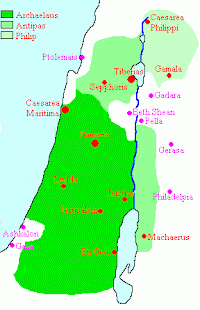Herod Archelaus
Herod Archelaus: Jewish leader, ruler of Samaria, Judaea, and Idumea between 4 BCE and 6 CE. His rule was disastrous and he was sent into exile by the Roman emperor Augustus.

Herod Archelaus was born in 23 BCE as the son of king Herod and his wife Malthace; he was full brother of Herod Antipas and a half brother of Philip. With these brothers, he was sent as a hostage to Rome, where he received his education. In his father's testament, Herod Archelaus was appointed king, but the Roman emperor Augustus wrote him that he had to content himself with the title of ethnarch ("national leader" ) of Samaria, Judaea and Idumea.
Immediately after his accession in 4 BCE, things went wrong. When Herod had fallen ill, two popular teachers, Judas and Matthias, had incited their pupils to remove the golden eagle from the entrance of the Temple. After all, according to the Ten Commandments, it was a sin to make idols. The teachers and their pupils had been burned alive (March 13, 4). The new king had to face an angry crowd that demanded rehabilitation of these martyrs; some three thousand Jews were killed during the celebration of Passover. For a moment, all seemed quiet, and Archelaus traveled to Rome, to have himself crowned by the emperor Augustus.
In his absence, there were fresh riots. The leaders were a robber named Judas, a royal slave called Simon, a shepherd named Athronges and his brothers. Perhaps, they were all messianic claimants; in case of Athronges, this is even probable. Archelaus' troops were unable to cope with them, and the Roman governor of Syria, Publius Quinctilius Varus, had to intervene. It was a major operation, which probably involved all Syrian legions (III Gallica, VI Ferrata, X Fretensis). Two thousand people were crucified, but not all leaders were caught. Ultimately, Archelaus came to terms with one of Athronges' brothers, something that will not have made a good impression. Matthew implies that Jesus' parents Joseph and Mary were afraid to go to the territories ruled by Archelaus, and therefore settled in Galilee (Matthew 2.22).
Herod Archelaus ruled so badly that the Jews and Samarians unitedly appealed to Rome to request that he should be deposed. In 6 CE, Archelaus was banished to Vienna in Gaul and after a bloody revolt led by Judas the Galilean, Judaea became a province of the Roman Empire. Archelaus must have died before 18.
Several of his coins show a bunch of grapes. This was the most common picture on a Jewish coins, reminding the user of the coin of the fabulous fertility of the country (the image is derived from Numbers 13.23). A crested morion was shown on the reverse; its significance is unclear to us, although it must be pointed out that this "Boeotian helmet" was very un-Roman. Other coins showed the bow of a ship and a laurel wreath.
Literature
The most important ancient source for the rule of king Herod Archelaus was written by Flavius Josephus: the Jewish War and Jewish Antiquities.
Modern literature: Nikos Kokkinos, The Herodian Dynasty: Origins, Role in Society and Eclipse (1998 Sheffield)